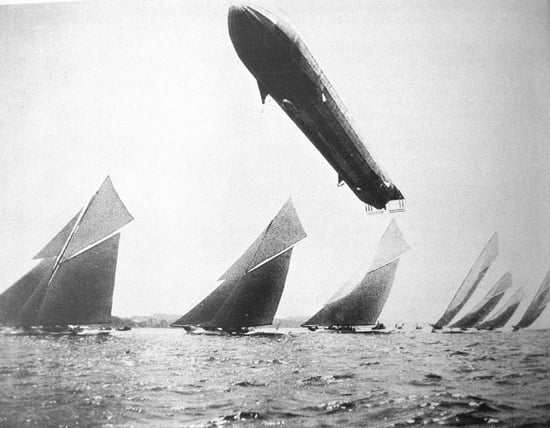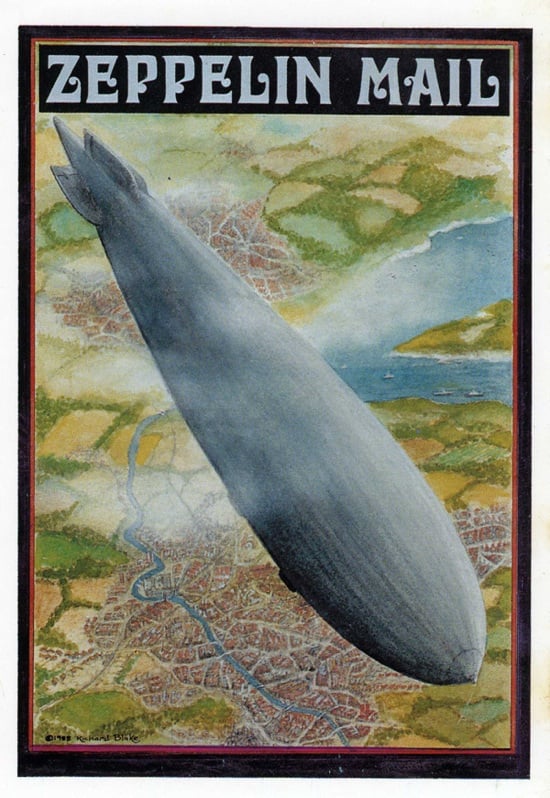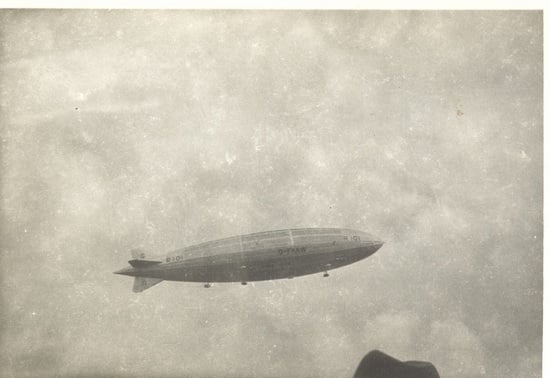With the Night Mail (3)
By:
April 4, 2012

HILOBROW is pleased to present the third installment of our serialization of Rudyard Kipling’s With the Night Mail (and his follow-up story, “As Easy as A.B.C.”). New installments will appear each Wednesday for 12 weeks.
With the Night Mail follows the exploits of an intercontinental mail dirigible battling the perfect storm. Between London and Quebec we learn that a planet-wide Aerial Board of Control (A.B.C.) now enforces a technocratic system of command and control not only in the skies but in world affairs, too. A follow-up story, “As Easy As A.B.C.,” recounts what happens when agitators in Chicago demand a return of democracy: The A.B.C. sends zeppelins armed with sound weapons to subdue not the agitators, but a mob who would destroy them! With the Night Mail is set in 2000, and it first appeared in 1905; 2012 marks the centennial of the first publication of “As Easy As A.B.C.”
In June, HiLoBooks will publish a beautiful new edition of With the Night Mail (and “As Easy as A.B.C.”), checked against the 1909 first published edition (Doubleday), with an Introduction by science fiction author Matthew De Abaitua, and an Afterword by science fiction author Bruce Sterling. SUPPLIES ARE LIMITED! CLICK HERE TO ORDER YOUR COPY.
SUBSCRIBE to HILOBROW’s serialized fiction via RSS.
LAST WEEK: “The skipper comes up, still appealing to us to stand by and see him fetch St. John’s. He dives below and returns — at which we little human beings in the void cheer louder than ever — with the ship’s kitten. Up fly the liner’s hissing slings; her underbody crashes home and she hurtles away again. The dial shows less than 3,000 feet.”
ALL EXCERPTS: 1 | 2 | 3 | 4 | 5 | 6 | 7 | 8 | 9 | 10 | 11 | 12
Captain Hodgson opens the underbody colloid, swings the heavy pithing-iron out of its rack which in liners is generally cased as a settee, and at two hundred feet releases the catch. We hear the whir of the crescent-shaped arms opening as they descend. The derelict’s forehead is punched in, starred across, and rent diagonally. She falls stern first, our beam upon her; slides like a lost soul down that pitiless ladder of light, and the Atlantic takes her.
“A filthy business,” says Hodgson. “I wonder what it must have been like in the old days.”
The thought had crossed my mind too. What if that wavering carcass had been filled with International-speaking men of all the Internationalities, each one of them taught (that is the horror of it!) that after death he would very possibly go forever to unspeakable torment?
And not half a century since, we (one knows now that we are only our fathers re-enlarged upon the earth), we, I say, ripped and rammed and pithed to admiration.
Here Tim, from the control-platform, shouts that we are to get into our inflators and to bring him his at once.

We hurry into the heavy rubber suits — and the engineers are already dressed — and inflate at the air-pump taps. G. P. O. inflators are thrice as thick as a racing man’s “flickers,” and chafe abominably under the armpits. George takes the wheel until Tim has blown himself up to the extreme of rotundity. If you kicked him off the c. p. to the deck he would bounce back. But it is “162” that will do the kicking.
“The Mark Boat’s mad — stark ravin’ crazy,” he snorts, returning to command. “She says there’s a bad blow-out ahead and wants me to pull over to Greenland. I’ll see her pithed first! We wasted an hour and a quarter over that dead duck down under, and now I’m expected to go rubbin’ my back all round the Pole. What does she think a postal packet’s made of? Gummed silk? Tell her we’re coming on straight, George.”
George buckles him into the Frame and switches on the Direct Control. Now under Tim’s left toe lies the port-engine Accelerator; under his left heel the Reverse, and so with the other foot. The lift-shunt stops stand out on the rim of the steering-wheel where the fingers of his left hand can play on them. At his right hand is the midships engine lever ready to be thrown into gear at a moment’s notice. He leans forward in his belt, eyes glued to the colloid, and one ear cocked toward the General Communicator. Henceforth he is the strength and direction of “162,” through whatever may befall.
The Banks Mark Boat is reeling out pages of A. B. C. Directions to the traffic at large. We are to secure all “loose objects”; hood up our Fleury Rays; and “on no account to attempt to clear snow from our conning-towers till the weather abates.” Under-powered craft, we are told, can ascend to the limit of their lift, mail-packets to look out for them accordingly; the lower lanes westward are pitting very badly, “with frequent blow-outs, vortices, laterals, etc.”
Still the clear dark holds up unblemished. The only warning is the electric skin-tension (I feel as though I were a lace-maker’s pillow) and an irritability which the gibbering of the General Communicator increases almost to hysteria.
We have made eight thousand feet since we pithed the tramp and our turbines are giving us an honest two hundred and ten knots.

Very far to the west an elongated blur of red, low down, shows us the North Banks Mark Boat. There are specks of fire round her rising and falling — bewildered planets about an unstable sun — helpless shipping hanging on to her light for company’s sake. No wonder she could not quit station.
She warns us to look out for the backwash of the bad vortex in which (her beam shows it) she is even now reeling.
The pits of gloom about us begin to fill with very faintly luminous films — wreathing and uneasy shapes. One forms itself into a globe of pale flame that waits shivering with eagerness till we sweep by. It leaps monstrously across the blackness, alights on the precise tip of our nose, pirouettes there an instant, and swings off. Our roaring bow sinks as though that light were lead — sinks and recovers to lurch and stumble again beneath the next blow-out. Tim’s fingers on the lift-shunt strike chords of numbers —1:4:7:—2:4:6:—7:5:3, and so on; for he is running by his tanks only, lifting or lowering her against the uneasy air. All three engines are at work, for the sooner we have skated over this thin ice the better. Higher we dare not go. The whole upper vault is charged with pale krypton vapours, which our skin friction may excite to unholy manifestations. Between the upper and the lower levels —5,000, and 7,000, hints the Mark Boat — we may perhaps bolt through if…. Our bow clothes itself in blue flame and falls like a sword. No human skill can keep pace with the changing tensions. A vortex has us by the beak and we dive down a two-thousand-foot slant at an angle (the dip-dial and my bouncing body record it) of thirty-five. Our turbines scream shrilly; the propellers cannot bite on the thin air; Tim shunts the lift out of five tanks at once and by sheer weight drives her bulletwise through the maelstrom till she cushions with a jar on an up-gust, three thousand feet below.
“Now we’ve done it,” says George in my ear. “Our skin-friction that last slide, has played Old Harry with the tensions! Look out for laterals, Tim, she’ll want some holding.”
“I’ve got her,” is the answer. “Come up, old woman.”
She comes up nobly, but the laterals buffet her left and right like the pinions of angry angels. She is jolted off her course in four ways at once, and cuffed into place again, only to be swung aside and dropped into a new chaos. We are never without a corposant grinning on our bows or rolling head over heels from nose to midships, and to the crackle of electricity around and within us is added once or twice the rattle of hail — hail that will never fall on any sea. Slow we must or we may break our back, pitch-poling.
“Air’s a perfectly elastic fluid,” roars George above the tumult. “About as elastic as a head sea off the Fastnet, aint it?”
He is less than just to the good element. If one intrudes on the Heavens when they are balancing their volt-accounts; if one disturbs the High Gods’ market-rates by hurling steel hulls at ninety knots across tremblingly adjusted electric tensions, one must not complain of any rudeness in the reception. Tim met it with an unmoved countenance, one corner of his under lip caught up on a tooth, his eyes fleeting into the blackness twenty miles ahead, and the fierce sparks flying from his knuckles at every turn of the hand. Now and again he shook his head to clear the sweat trickling from his eyebrows, and it was then that George, watching his chance, would slide down the life-rail and swab his face quickly with a big red handkerchief. I never imagined that a human being could so continuously labour and so collectedly think as did Tim through that Hell’s half hour when the flurry was at its worst. We were dragged hither and yon by warm or frozen suctions, belched up on the tops of wulli-was, spun down by vortices and clubbed aside by laterals under a dizzying rush of stars in the company of a drunken moon. I heard the rushing click of the midship-engine-lever sliding in and out, the low growl of the lift-shunts, and, louder than the yelling winds without, the scream of the bow-rudder gouging into any lull that promised hold for an instant. At last we began to claw up on a cant, bow-rudder and port-propeller together; only the nicest balancing of tanks saved us from spinning like the rifle-bullet of the old days.
“We’ve got to hitch to windward of that Mark Boat somehow,” George cried.
“There’s no windward,” I protested feebly, where I swung shackled to a stanchion. “How can there be?”
He laughed — as we pitched into a thousand foot blow-out — that red man laughed beneath his inflated hood!
“Look!” he said. “We must clear those refugees with a high lift.”

The Mark Boat was below and a little to the sou’west of us, fluctuating in the centre of her distraught galaxy. The air was thick with moving lights at every level. I take it most of them were trying to lie head to wind but, not being hydras, they failed. An under-tanked Moghrabi boat had risen to the limit of her lift and, finding no improvement, had dropped a couple of thousand. There she met a superb wulli-wa and was blown up spinning like a dead leaf. Instead of shutting off she went astern and, naturally, rebounded as from a wall almost into the Mark Boat, whose language (our G. C. took it in) was humanly simple.
“If they’d only ride it out quietly it ’ud be better,” said George in a calm, as we climbed like a bat above them all. “But some skippers will navigate without enough lift. What does that Tad-boat think she is doing, Tim?”
“Playin’ kiss in the ring,” was Tim’s unmoved reply. A Trans-Asiatic Direct liner had found a smooth and butted into it full power. But there was a vortex at the tail of that smooth, so the T. A. D. was flipped out like a pea from off a fingernail, braking madly as she fled down and all but over-ending.
“Now I hope she’s satisfied,” said Tim. “I’m glad I’m not a Mark Boat… Do I want help?” The C. G. dial had caught his ear. “George, you may tell that gentleman with my love — love, remember, George — that I do not want help. Who is the officious sardine-tin?”
“A Rimouski drogher on the lookout for a tow.”
“Very kind of the Rimouski drogher. This postal packet isn’t being towed at present.”
“Those droghers will go anywhere on a chance of salvage,” George explained. “We call ’em kittiwakes.”
A long-beaked, bright steel ninety-footer floated at ease for one instant within hail of us, her slings coiled ready for rescues, and a single hand in her open tower. He was smoking. Surrendered to the insurrection of the airs through which we tore our way, he lay in absolute peace. I saw the smoke of his pipe ascend untroubled ere his boat dropped, it seemed, like a stone in a well.
We had just cleared the Mark Boat and her disorderly neighbours when the storm ended as suddenly as it had begun. A shooting-star to northward filled the sky with the green blink of a meteorite dissipating itself in our atmosphere.
Said George: “That may iron out all the tensions.” Even as he spoke, the conflicting winds came to rest; the levels filled; the laterals died out in long easy swells; the airways were smoothed before us. In less than three minutes the covey round the Mark Boat had shipped their power-lights and whirred away upon their businesses.
“What’s happened?” I gasped. The nerve-storm within and the volt-tingle without had passed: my inflators weighed like lead.
“God, He knows!” said Captain George, soberly. “That old shooting-star’s skin-friction has discharged the different levels. I’ve seen it happen before. Phew! What a relief!”
NEXT WEEK: “Then the Sun rises and through the colloid strikes out our lamps. Tim scowls in his face. ‘Squirrels in a cage,’ he mutters. ‘That’s all we are. Squirrels in a cage! He’s going twice as fast as us. Just you wait a few years, my shining friend and we’ll take steps that will amaze you. We’ll Joshua you!'”
RADIUM AGE SCIENCE FICTION: “Radium Age” is HILOBROW’s name for the 1904–33 era, which saw the discovery of radioactivity, the revelation that matter itself is constantly in movement — a fitting metaphor for the first decades of the 20th century, during which old scientific, religious, political, and social certainties were shattered. This era also saw the publication of genre-shattering writing by Edgar Rice Burroughs, Sax Rohmer, E.E. “Doc” Smith, Jack London, Arthur Conan Doyle, Aldous Huxley, Olaf Stapledon, Karel Čapek, H.P. Lovecraft, Charlotte Perkins Gilman, Yevgeny Zamyatin, Philip Gordon Wylie, and other pioneers of post-Verne/Wells, pre-Golden Age “science fiction.” More info here.
HILOBOOKS: The mission of HiLoBooks is to serialize novels on HiLobrow; and also, as of 2012, operating as an imprint of Richard Nash’s Cursor, to reissue Radium Age science fiction in beautiful new print editions. So far, we have published Jack London’s The Scarlet Plague, Rudyard Kipling’s With the Night Mail (and “As Easy as A.B.C.”), Arthur Conan Doyle’s The Poison Belt, H. Rider Haggard’s When the World Shook, Edward Shanks’s The People of the Ruins, William Hope Hodgson’s The Night Land, and J.D. Beresford’s Goslings. Forthcoming: E.V. Odle’s The Clockwork Man, Cicely Hamilton’s Theodore Savage, and Muriel Jaeger’s The Man with Six Senses. For more information, visit the HiLoBooks homepage.
READ: You are reading Rudyard Kipling’s With the Night Mail and “As Easy As A.B.C.” Also read our serialization of: Jack London’s The Scarlet Plague | H. Rider Haggard’s When The World Shook
ORIGINAL FICTION: HILOBROW has serialized three novels: James Parker’s The Ballad of Cocky The Fox (“a proof-of-concept that serialization can work on the Internet” — The Atlantic) and Karinne Keithley Syers’s Linda Linda Linda. We also publish original stories and comics.
